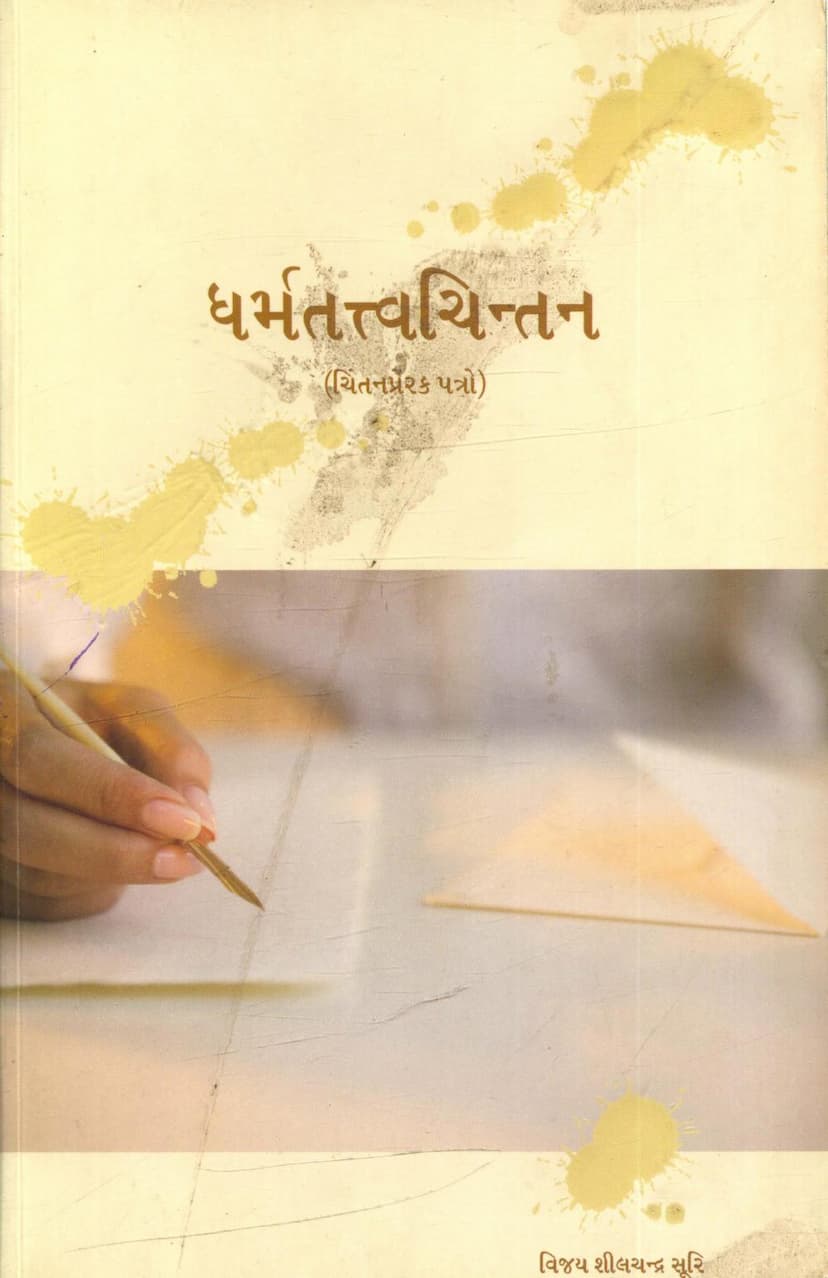Dharm Tattva Chintan Part 01
Added to library: September 1, 2025

Summary
This is a comprehensive summary of "Dharm Tattva Chintan Part 01" by Sheelchandrasuri, published by Shri Bhadrankaroday Shikshan Trust. The book is a collection of contemplative letters (chintanperak patro) written by Vijay Sheelchandrasuri.
Overview:
The book is a collection of philosophical and spiritual letters written by the author, Muni Vijay Sheelchandrasuri, over a period of 12 years, from V.S. 1951 to 2054. These letters were initially written in response to requests from householders for continued spiritual guidance and discourse. Recognizing the impossibility of writing individual letters to everyone, the author decided to write one enlightening letter per month and share it with the inquisitive.
The letters, though written by a Jain monk for Jain householders, aim to be understood and thought-provoking even by non-Jains, with efforts made to simplify Jain terminology. The core theme that runs through the letters is "Dharmalakshi Jivan ane Jivanlakshi Dharm" – a life focused on Dharma and Dharma focused on life.
Key Themes and Content:
The book is divided into seven thematic sections, with each letter dated at the end for reference. While the exact content of each of the seven sections isn't fully detailed without reading the book, the introductory notes and the sampled letters provide insight into the broad range of topics covered:
-
The Law of Karma (Karm Nu Niyam): The book begins by discussing the fundamental Jain principle of Karma, refuting the notion that it is rigid, joyless, or promotes inaction. It likens it to a democratic concept of individual freedom and responsibility, where actions have direct consequences. The author emphasizes that acceptance of karma's supremacy keeps the soul free and equal, without the need for subservience to a creator deity. True devotion, according to Jainism, lies in acknowledging one's own actions while attributing outcomes to the divine nature of the liberated soul.
-
The Nature of the Worldly Existence (Sansar nu Swaroop): The author delves into the nature of worldly existence, describing it as fundamentally characterized by "Klesh" (suffering or conflict). He identifies "Ahankara" (ego) and "Ichha" (desire) as the root causes of this suffering, stating that both must be eradicated for spiritual progress. The dependency of ego on desire and vice-versa is highlighted, emphasizing that eliminating one leads to the downfall of the other. The text illustrates how unfulfilled desires and wounded egos lead to anger, hatred, despair, and a sense of the world being pointless.
-
Spiritual Practices and Devotion (Dharm Aradhana & Bhakti): The book touches upon various spiritual practices like meditation, prayer, and adherence to religious observances. It questions the concept of "true devotion" and distinguishes it from superficial or "false" devotion. True devotion, it suggests, is marked by sincere surrender and detachment, leading to liberation from the cycle of birth and death. The author critiques the presence of self-interest and expectation in many forms of devotion, contrasting it with pure, unconditional love.
-
The Importance of Knowledge and Understanding (Gyan & Samajh): Several passages stress the need for wisdom and correct understanding to navigate life's complexities and overcome internal struggles. The author argues that a lack of true understanding leads to illusions and wrong perceptions. True knowledge, he suggests, fosters humility, simplicity, and acceptance, helping one deal with adversities with equanimity.
-
Critique of Societal Practices and Hypocrisy: The book addresses the prevalent societal issues like the misuse of religious platforms for personal gain, the obsession with outward rituals over inner transformation, and the decline in genuine spiritual practice. There's a critique of those who are busy finding fault in others while ignoring their own shortcomings. The author also touches upon the superficiality of celebrations and the need to focus on the essence of religious principles.
-
The Nature of Self and Divinity: The text explores the concept of the soul (Atma) and its journey towards the divine. It emphasizes that true divinity is not an external entity but an inherent state of purity and consciousness within each soul, achievable through righteous conduct and spiritual discipline.
-
The Significance of Renunciation and Detachment (Tyag & Virakti): The letters promote the philosophy of renunciation and detachment from worldly possessions and desires as a path to spiritual liberation. The author highlights that true happiness and peace come from within, not from external acquisitions.
-
Ethical Living and Compassion (Naitik Jivan & Karuna): The letters advocate for living an ethical life, practicing compassion towards all living beings, and avoiding harm in any form. The importance of selfless service and acting with pure intentions is repeatedly emphasized.
-
The Power of Prayer and Faith (Prarthna & Vishwas): The book discusses the profound impact of sincere prayer and unwavering faith in the face of adversity. It suggests that true faith can overcome obstacles and bring about positive transformations.
-
Personal Growth and Self-Improvement: Throughout the letters, there's a recurring emphasis on self-reflection, self-awareness, and continuous self-improvement as essential components of spiritual growth. The author encourages readers to introspect, identify their weaknesses, and strive to overcome them through consistent spiritual practice.
Structure and Style:
The book is structured as a series of letters, making the content relatable and accessible. The author's style is characterized by its clarity, simplicity, and profound spiritual insights. He uses everyday examples and analogies to explain complex philosophical concepts, making them easier for the reader to grasp. The language is Gujarati, and the tone is encouraging, guiding, and deeply compassionate.
Publisher and Purpose:
Shri Bhadrankaroday Shikshan Trust, Godhra, published this book in 2010 (V.S. 2066). The trust's mission is to disseminate spiritual knowledge and promote Jainism, and this book serves as a significant contribution to that goal.
In essence, "Dharm Tattva Chintan Part 01" is a guide to living a meaningful and spiritually fulfilling life, rooted in Jain principles, by cultivating self-awareness, ethical conduct, and a deep understanding of the self and the universe.